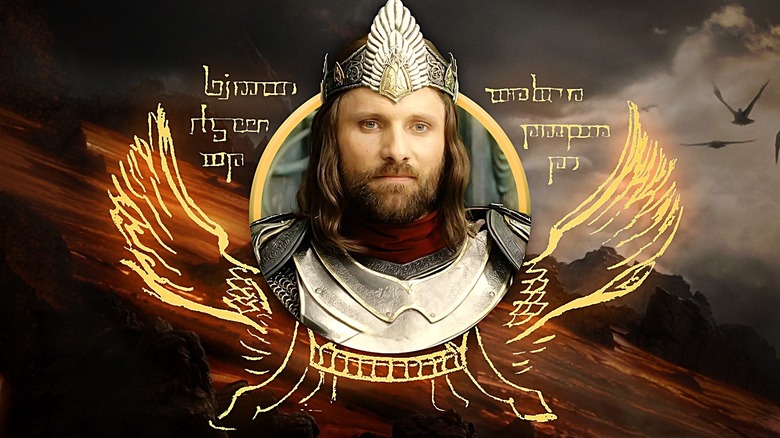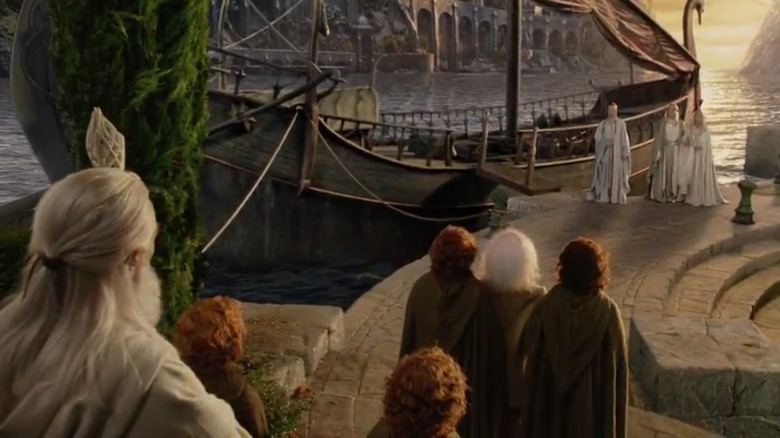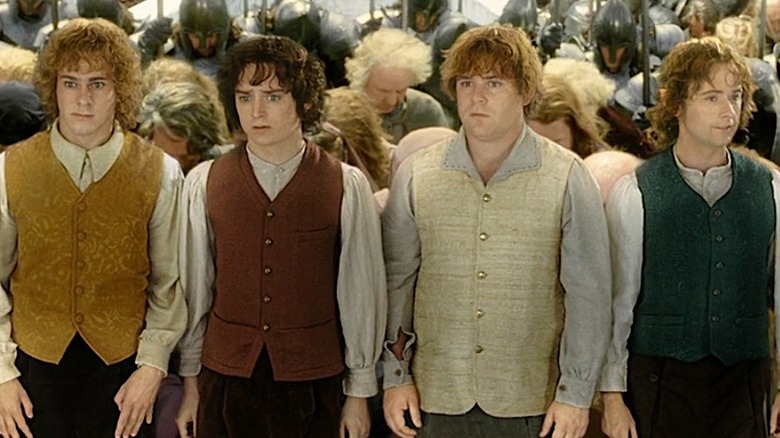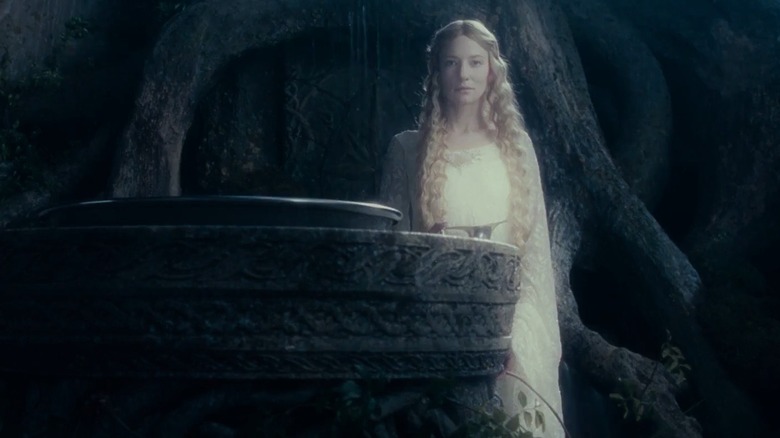How Return Of The King's Ending Changed From The Book – And How It Changes Lord Of The Rings
Everyone wants to complain about adaptions changing the source material, seemingly nowhere more than stories set in Middle-earth. Prime Video's TV series "The Rings of Power" is making shocking (but hard to avoid) changes to Tolkien's canon. Magic the Gathering reimagined many "Lord of the Rings" characters for its recently released card expansion. "The War of the Rohirrim" anime is hyping up Helm's daughter Héra, even though she is unnamed and nearly irrelevant in the books.
While there is always plenty to criticize as more adaptations of Tolkien's world pop up, it's important to remember that Peter Jackson's trilogy wasn't flawless. Jackson's "The Lord of the Rings" films are considered the adaptive gold standard, not just for Middle-earth but for all fantasy films. They capture the excitement and heart of the books and generally follow the story — but they don't do so perfectly. Arwen showing up to save Frodo, Elves at Helm's Deep, and ghostly green ghouls on the fields of the Pelennor are just a handful of the more egregious adjustments made during the transition from book to screen. (Don't even get me started on the fact that Aragorn has a beard...)
One of the biggest changes of all, though, is what the films don't show, especially at the end of "The Return of the King."
What happens in Peter Jackson's Return of the King movie ending
Okay, okay. If you want to be a stickler, the actual ending of Jackson's trilogy is pretty spot on. Frodo sails away into the West, and Sam returns home, hugs his fledgling Hobbit family, and says, "Well, I'm back." Beautiful and accurate.
But the verbatim phrase — the line is literally the end of the story for both film and book — covers up a major adjustment to the end of "The Return of the King." For starters, let's point out the obvious. This story has a ton of endings. It feels like the movie is almost over several times, but it just keeps on going. This isn't a bad thing — multiple endings are a necessary part of "The Return of the King." Let's run through the menagerie of conclusions (based on the more fleshed-out extended edition).
After the One Ring is destroyed, we get a sequence of Sauron's fall and the triumph of the Men of the West. Then, we get an extended sequence in Gondor, where Aragorn is crowned king, Arwen becomes queen, and the Hobbits bow to no one. Next up, we follow the Hobbits back to the Shire, where they settle back into normal life, and Sam finally gets married to Rosie Cotton. Frodo finishes the Red Book of Westmarch, gives it to Sam to fill in the final pages, and heads off to sail away into the West with Bilbo, Gandalf, and company. Sam comes home and all is well with the world, and that's where the film's story ends.
What happens in J.R.R. Tolkien's Return of the King book ending
"The Return of the King" book has some similar beats with one major exception. Before we dive into the progression, I just want to point out that you can make the case that the book "ends" for at least six chapters. So, yeah, the long movie ending is well warranted. In those ending chapters, we start with the destruction of the One Ring and a lengthy celebration for days on end, right near the Black Gate. Eventually, the party moves back to Gondor, where half of a chapter is devoted to Faramir and Éowyn's love story (I won't fault Jackson for this one, though — at least there's a brief added scene in the extended edition where they get a moment).
From there, Aragorn is officially crowned, Arwen becomes queen, and eventually, a huge, homeward-bound cavalcade heads north for another chapter as we bid one major character after another farewell. Once the four Hobbit heroes reach Bree again, though, things start to go wrong again. They discover that Saruman (who doesn't die falling off of Orthanc like in the extended edition of the movie) has overrun the Shire with his minions — men that are referred to as "ruffians." The chapter "The Scouring of the Shire" outlines the events that follow as Merry and Pippin raise an army of Hobbits and defeat their country's occupiers. Sam helps where he can, and the spiritually exhausted Frodo fills the role of peacemaker, trying to avoid the shedding of blood wherever possible.
In the end, the Ruffians are killed or flee, and the Hobbits confront Saruman right on the doorstep of Bag End. The unrepentant Wizard is unexpectedly killed by an enraged and insulted Wormtongue, who stabs him in the back before he's mowed down by Hobbit arrows. From there, the Hobbits begin cleaning up and restoring their homeland, a process that takes months just to get going. However, they eventually reap the benefits of their labor, and the following year is considered exceptionally blessed and fruitful. From there, Frodo sails off into the West, and Sam returns home and says that he's back — and that's a wrap.
How Peter Jackson's Return of the King adaptation changed Lord of the Rings forever
Both the book and movie have lengthy, progressive endings, and for the most part, they match up pretty well. However, the glaring exception is the Scouring of the Shire. The wanton destruction of the Hobbit homeland is a critical part of the story. In the book, Gandalf specifically tells the Hobbits that "You must settle [The Shire's] affairs yourselves; that is what you have been trained for." Tolkien himself added in the foreword to "The Fellowship of the Ring" book that the Scouring of the Shire is "an essential part of the plot, foreseen from the outset, though in the event modified by the character of Saruman as developed in the story..."
In other words, the need for the Hobbits to reclaim their homeland on their own is a key part of the story's conclusion, and removing it sends quiet yet critical shockwaves through the story that precedes it. For instance, we get a glimpse of the oppression in the Shire in the Mirror of Galadriel in the movie, but Jackson had to pivot. He spins the horrifying glimpse as something that "could be" if Frodo fails. In the books, Sam sees that vision presented as something that could very well be real, and he needs to choose between Frodo and the quest or protecting his home. In the event, he wisely chooses to save all of Middle-earth by continuing the quest, but they ultimately do have to deal with the consequences of leaving the Shire. Elrond also touches on the safety of the Shire even earlier in "The Fellowship of the Ring" when he argues that Pippin and Merry shouldn't come on the quest, adding that the Shire is not free from peril and he hoped to send them back to warn the Hobbits of impending danger. They don't go, and ultimately have to fight a small war as a result.
The removal of the Scouring of the Shire didn't completely derail the movie. However, it did take away a significant and poignant point in the story designed to demonstrate the maturity, capability, and confidence that the Hobbits develop throughout their adventures. Also, who wouldn't want to see a Hobbit army attacking a group of Human ruffians? Sounds like a hoot.



